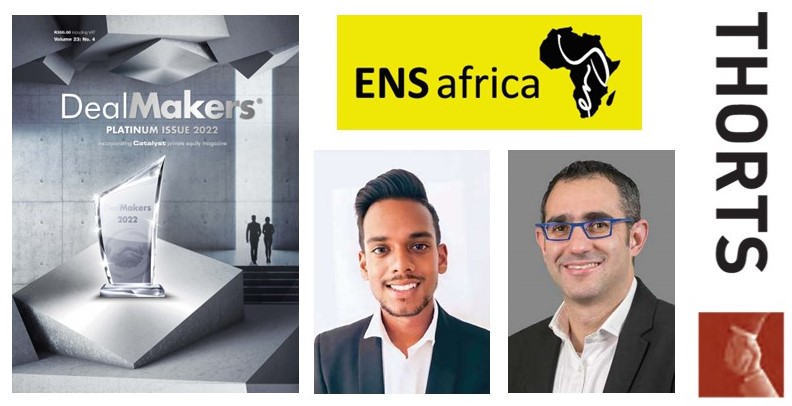Against the backdrop of economic stagnation and a predicted recession, a plethora of South African companies are hard at work, searching for innovative strategies to create value and liquidity for their shareholders.
One such strategy is an endeavour to pay its shareholders a donation instead of a dividend, to avoid the mandatory solvency and liquidity test enshrined in section 4 of the Companies Act No. 71 of 2008, as amended (Companies Act).
In terms of Section 46(1) of the Companies Act, a company must not make any proposed distribution unless (i) it reasonably appears that the company will satisfy the solvency and liquidity test immediately after completing the proposed distribution; and (ii) the board of the company, by resolution, has acknowledged that it has applied the solvency and liquidity test, as set out in section 4 of the Companies Act, and reasonably concluded that the company will satisfy the solvency and liquidity test immediately after completing the proposed distribution.
Section 4 of the Companies Act provides that a company satisfies the solvency and liquidity test at a particular time if, considering all reasonably foreseeable financial circumstances of the company at that time (i) the assets of the company, as fairly valued, equal or exceed the liabilities of the company, as fairly valued; and (ii) it appears that the company will be able to pay its debts as they become due in the ordinary course of business for a period of 12 months following that distribution. Accordingly, cash-strapped companies, aware that they may not pass the solvency and liquidity test, may perceive the payment of a donation to its shareholders as a strategy to evade the solvency and liquidity test. However, this strategy will not be permissible in our corporate law framework, as indicated below.
Companies should be mindful that a “distribution” as defined in section 1 of the Companies Act is far wider than the generally assumed concept of a payment by a company of a cash or in specie dividend to its shareholders, as contemplated in subsection (a)(i) of the definition. Boards, therefore, need to ensure that other qualifying transactions, such as a donation, are not overlooked for the purposes of compliance with section 46.
In terms of the Companies Act, the formulation of a “distribution” encompasses, in the first instance, a direct or indirect transfer by a company (paying company) of money or other property to or for the benefit of (i) one or more holders of any of the shares in the paying company or (ii) to the holder of a beneficial interest in shares of the paying company or (iii) in any other company in the same group of companies as the paying company (para (a) of the definition of distribution in the Companies Act). In Henochsberg on the Companies Act 71of 2008, P Delport et al. notes that an “indirect” transfer is a transaction of whatever nature if the substance is the transfer of company property or money to a shareholder without any consideration received by the company.
Donations as a distribution
A company makes a donation by paying money or parting with other assets in instances where the entity is not legally obliged to do so. A donation can also occur in instances where a company enters into a unilateral undertaking with only obligations and no rights; for example, a contract of donation. For the sake of brevity, all such donations are herein referred to as “gifts”.
In Commentary on the Companies Act, 2008, J Yeats et al. posits that gifts made by companies fall into two categories:
a) Category 1: this category refers to gifts that further, realise or are incidental or conducive to a business object (business gifts). Category 1 is extrapolated from Commissioner for Inland Revenue v Pick ‘n Pay Wholesalers (Pty) Ltd (1987(3)SA 453(A) 469), where Nicholas AJA referred to donations made with a ‘business object’; and
b) Category 2: this category refers to gifts that are not made in pursuit of a business object and is a gratuitous transaction motivated by benevolence (pure gifts).
In the context of the definition of “distribution” in the Companies Act, it is clear that the making of both business gifts and pure gifts to shareholders would be considered a “distribution” for the purpose of the Companies Act, and the company would be required to comply with section 46 to provide such gifts to its shareholders.
In Commentary the Companies Act, 2008, J Yeats et al. raises the question of whether pure gifts to persons other than in their capacity as shareholders should be regulated by the Companies Act. Based on the above, it is clear that section 46 would not apply, because such gifts would not be “distributions”, as defined in the Companies Act.
They also note that directors would ordinarily have the power to make gifts in accordance with their general powers to operate a company (subject to any restrictions in a company’s memorandum of incorporation). The questions that are raised in such commentary are whether the exercise of such powers by the directors to make a gift is indeed unconditional, and why should the solvency and liquidity standing of the company not be taken into account by the directors before making any gifts? On the basis of insolvency legislation, it would stand to reason that a gift should only be made using the company’s net assets, but what about the liquidity test? The authors note that it would seem improbable that the legislative safeguards offered by the solvency and liquidity test for a “distribution” would not likewise be applicable to the provision of gifts by a company. Therefore, further clarification by legislation is necessary.
Tevin Ramalu is a Candidate Legal Practitioner and Leonard Bilchitz is an Executive in the Corporate-Commercial Department | ENSafrica

This article first appeared in DealMakers, SA’s quarterly M&A publication.
DealMakers is SA’s M&A publication.
www.dealmakerssouthafrica.com



